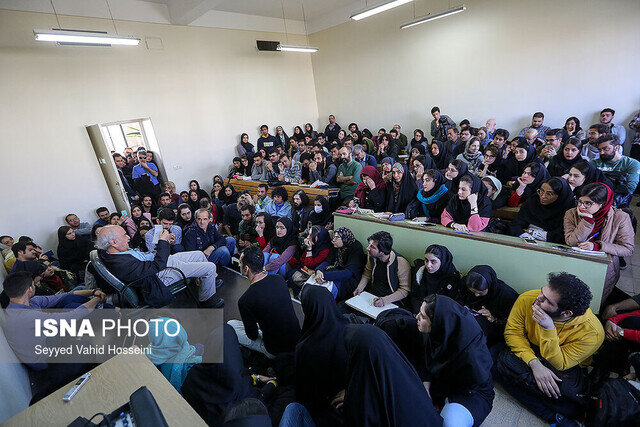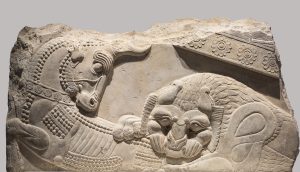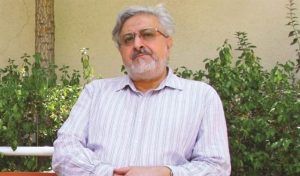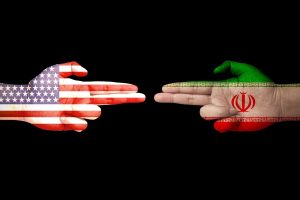Thought Group: Wikipedia cites Dr. Homayoun Katouzian’s education in the field of economics and sociology. His book of political economics is among scholars and academics. The theory of the short -term Katouzian community is also widely used among sociologists and politicians. But the Iranian academic community is less familiar with the depth of its literary views. From him until year 2, more than seven books on Iranian history and literature have been published in English. Interview with Dr. Homayoun Katouzian on the dimensions and works of Dr. Mohammad Reza Shafi’i Kadkani in the fields of poetry, literary criticism, to the popular status of this Farzaneh thinker, by Ahmad Gholami and in Norouzi’s special letter. East Published. Katouzian was familiar with the poems of the codec, but in the forties, he became closely acquainted with the codec who had gone to Oxfur for study opportunities, as they went home and eaten bread and salt. He views Shafi’i as a multifaceted and influential figure in Iranian culture, referring to the diversity and comprehensiveness of Shafi’i codys, from poetry and literary criticism to the correction of linguistic texts and research, and considers him the weight of Anvari, Nasser Khosrow, Bahar and the like. Katouzian considers Shafi’i poetry committed to ethics and freedom, citing examples of his poems that express this commitment, and Shafi’i’s popularity among the people and cultural elites is due to his prominent and purity works. In the field of stylistics, Katouzian, referring to Shafi’i’s view of the style of style, considers his poetic style to be influenced by the tradition of Khorasani style and the poetry of the Brotherhood and considers his innovations. In this interview, Katouzian refers to Shafi’i’s role in reviving Saadi’s position and confronting Saadi’s “Saadi” and presenting his views on Saadi. The Kathuzian considers all Shafi’i works of codification to be liked by poetry, and in particular the poetry, the book “with lights and mirrors”. This interview below:
****
Mohammad Reza Shafi’i Kadkani, Adib, Masjid, Researcher, Literary Critic, Poet and Professor of Literature are a multi -faceted face in our culture.
In all aspects, especially, poetry of literary criticism and elaborate teaching.
Shafi’i considers the codification of language as the existence of the history of human life and believes that every ethnicity lives within its own language and looks to the world through the window of its sound and syntactic structures and structures. And the world of thought makes it the importance of codification of language to the extent that it believes that the world outside the realm of language is meaningless. Even he considers the solution to political and social issues depending on understanding the issue of language. How do you think this idea has had on Shafi’i Cultural Wizards?
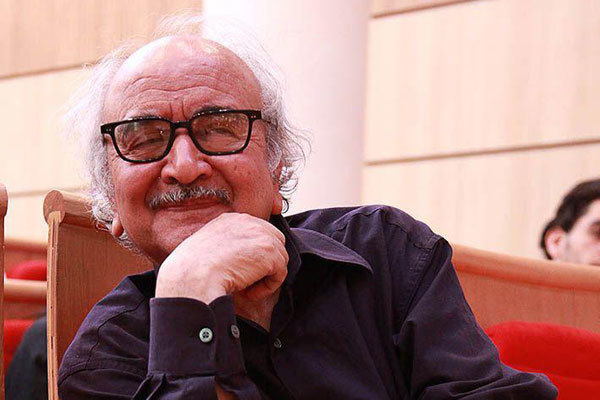
Dr. Mohammad Reza Shafi’i Codecny
I have not read anything about these opinions and beliefs, but I think most of the impact of Ferdinan’s two linguists and philosophers is Swiss and a semiotics and (Mala) structural linguistics and followers who have been influenced by modern literary theory, The twentieth century, and the obvious philosophy of linguistic philosophy (especially in the book Philosophical Studies), which considers them to be social, is that it solves the proper understanding of the concepts of social political problems.
Let me give you an example of my work. The distinction between the vocabulary of tyranny and dictatorship, or between national, nationalist, and nationalism, solves social political confusion about them. But let’s also add that, in my opinion, Wingshistein exaggerates it, underestimates the importance of fortune and reduces philosophy in language merely.
You in the book “What is History?” You consider the subject of “objectivity” to be indefinable or non -commitment in historical research, and you believe that commitment in poetry and writing is other categories, and the poet can be committed to freedom or any ideology or intellectual and social school. Shafi’i poetry is also called a committed, community -oriented and idealistic poet. How did this commitment appear in codecs?
Yes, especially in modern times, commitment has been common in literature and art, and it is not defective unless the commitment was “happiness” and suffocating, the worst example of which was the socialist realism of Geodansef – Stalin, when many of our poets and critics were involved in the work of others as “bourgeoisie”. I remember that someone in the early days of the revolution said that Iraj was not a poet because his poetry is not political! Spring, “long distance and suffering”.
Shafi’i is a poet committed to ethics and freedom. For example, “where such a hasty asked the breeze” or “in the alley of the gardens” or “the wave, the Caspian wave covers the mourning” and so on.
Dr. Shafi’i is one of the few contemporary Iranian literature that, in addition to the literary community and cultural elites, has a special place among the people and the community and youth. This general fortune over the university and literary professors in Dr. Kadkani in Iran is not very experienced. What do you think about this conduct and the master of codification?
That’s right. Shafi’i is right among both experts and among the tastes. This is, of course, most of his outstanding work. But his purity and freedom have also been effective. Name the theme, but many of his masters who are merely scientifically shattered with him did not have these attributes.
Dr. Shafi’i Kadkani says there is no text that has no light and no style can be recognized except by comparing soft and the degree of deviation from soft. In fact, the style of coding is a form of form of form. In other words, what kind of deviation do you think they have been rejected in his works?
Yes, you will not want any light artwork, even though it is not in a particular framework: for example, it is neither classic nor romantic, nor realistic, no surrealist, and so on. I think that there is no good, valuable and valuable work that is not deviated from soft or in simple transgenic language. But many are imitation and repetitive work and therefore do not last. Shafi’i poetry is in the tradition of Khorasani style and is somewhat influenced by the Brotherhood’s poetry that has the most original style of modern poetry; However, his art is not an imitation and has its own innovations. In addition, Shafi’i is at the same time as Anvari and Nasser Khosrow and Bahar and their scholars.
Dr. Katouzian, in a poem entitled “Letter” that you have written to Shafi’i Coding, you say “time” “Every new blossom is not, the arena and the denial.” You have written this poem in Shiraz on January 5. What kind of speech did you speak of at the time? And how did you think Shafi’i Coding has been able to say “hadith of love” in the four decades and a half that is going on?
I am submitting a copy of the poem that I have recently published by the revelation. “The time of the time” is the final poem of the Brotherhood Shahnameh, where he says, “Every new blossom is a play of the wind … the arena of denial and the glory.” I called it a time because there was no breath for me, on the one hand, the tyranny of the regime, and on the other hand, the religions of Marxism – Leninim – Stalinism, each of which had their own SAVAK, had put me in pure homeland – that is, comprehensive suffocation. That is, on the one hand, SAVAK tyrannical and socially disturbed me, and on the other hand, Savak’s opponents at best calling me a “bourgeois servant”. Finally, the work came to the point where I was read “Academic Jews”.
As you can see, you have been familiar with Shafi’i for at least the fifties. If you can tell you how to get acquainted with them.
I was introduced to Shafi’i poetry in the longest district, and I think it was year 2 or 5 when he came to Oxford with his wife and boy to take advantage of study opportunities. I was in the control of Kent University at the time, but I was traveling to Oxford. We met each other, saw each other’s house, and ate bread and salt.
I sent a sonnet with an informant “O Mahrukh Hadith / Had Hadith / In the Graf, Hang,” and he sent a piece in this fence / in this magical fence. ” According to Hafiz, “the good days were with a friend/ The rest was all unaware.”

Dr. Homayoun Katouzian
Shafi’i coding talks about Saadi’s popularity and artistic monarchy over eight centuries and believes that there is something in Saadi’s art that our other elders have less benefited from Saadi’s testing and empiricism in the vast life and different areas of social and individual life; What he himself interprets as “trading”. You also consider Saadi to be “poet of love and life”, a poet who has been talking about everything, is “trading” with Saadi’s “practical wisdom” and what you read Saadi’s critical realism? You have also spoken of Saadi Kashi in the article “Multiple Verb in Saadi’s thought and literature” that was prevalent in the second half of the twentieth century. In an interview, you said that Saadat’s whisper began in the thirties, and in the forties, you say that a renowned poet of Saadi’s poetry with “Pickle Badjun” and told Shafi’i Kadkani what to read if we read Saadi as a poet. However, do you think Saadi, after this time of Saadi’s and persecution, re -flourished and found his place?
You said Medina and Kurdish. I suffered for decades to see a handful of people famously slammed Saadi. Basically, because the poet, writer, and scholarly thinker, this way was so much less sanctioned by people who had not read anything, but I also had the grief of my hometown when I saw the Europeans and how the Europeans were to remember and how to do. And I was unfortunate that the few tons that had the right to protest the situation had been silent and not breaking.
I was not in the pit of Iran and my head was in a thousand places, but in the five years, I published in the Washington Iranian Journal of Iran Studies, which was later published as “Saadi Poet of Love and Life” by the Center for Publishing. But his compound had not yet been dried up only about this book at a cultural center, and at least two people condemned the publication of the book by a “out -of -the -way”, which I was, but if my name was James Brown or Jacques Cleman, they wouldn’t have been and what they didn’t say!
But this end of the story. In year 4, I wrote a book titled “The Poet of Life, Love and Compassion” (which is now translated and published in Iran) at the suggestion of an English publisher – in a series of books published by Patrichia Croune, a professor at the Institute of Higher Studies of Princeton – and I don’t know what to do in Iran! Together about Saadi, it is all wrong to have the right of Khosh and the Mysteries; Because Pattrichia was first of all, her name was Crown. Secondly, until that esteemed person was going to make a noise, it was the deceased. Thirdly, he didn’t have the slightest share in writing my book. But don’t sleep again. When the translation of the book was published by Mr. Firouzmand, his person still made a noise, which is full of falsehood and may not believe that a few years ago, when I translated the Chinese hand of Saadi’s sonnets into English and published with a relatively detailed introduction, and the translation center published with my English translation texts, but I did not know the English scientist!
Saadi, as I have written in several places, is a hard -working artist and thinker, and after eight centuries, both his arts can be enjoyed and learned from his wisdom and ethics. In Golestan, he says, “I had a good deal with humanity with humanity.” Yes, he deals with a lot of people and many things. His poems are at least unparalleled in human love for man. His understanding of life does not know time and place. I do not see any “practical wisdom” in the garden, and in Golestan, I call moderation what they call practical wisdom. In addition, Golestan is the largest literary book of the seventh century AH (12th).
The book of grace of water is not enough
To make the fingers more and more.
If you want to choose from Shafi’i literary works and activities, what works or works have you more thoughtful or more liked by you?
I like all the work in general. I love his poetry, I enjoyed reading the book “With Lights and Mirrors”. I found his criticism of Anvari and his corrections and suspensions in the Alawalia notice. We also add to what I would like to confirm his distinction from the “poet of literature” and “poet and press”?
216216
منبع: www.khabaronline.ir

